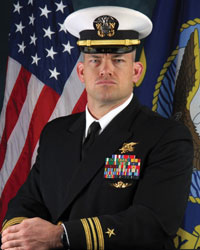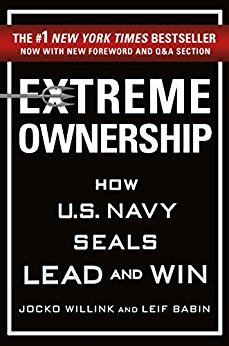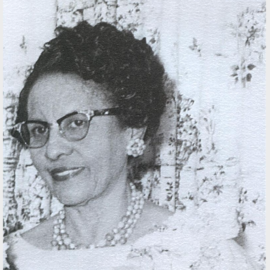

This article is an excerpt from the Shortform summary of "Extreme Ownership" by Jocko Willink and Leif Babin. Shortform has the world's best summaries of books you should be reading.
Like this article? Sign up for a free trial here .
Jocko Willink is a former U.S. Navy SEAL who trained SEAL leaders and led his own team as an officer during Operation Iraqi Freedom. Willink was a lieutenant commander and Leif Babin served under him as a ground force commander in Ramadi, Iraq, the deadly and hostile center of Iraqi insurgency. After their military careers, they went on to advise businesses in a wide range of industries through their consulting firm, Echelon Front.
Learn how Jocko Willink conducted himself in battle as a Navy SEAL, and how this led to his leadership ideas in Extreme Ownership.
Jocko Willink Battle Story: Taking Blame for a Battlefield Mistake
It’s the spring of 2006 and Willink is leading his forces in their first major operation in Ramadi, Iraq, where they’ll be deployed for nearly six months. Their mission involves about 300 U.S. and Iraqi troops, including SEALs, Army Soldiers, and Marines. The operation aims to wrest control of a particularly dangerous, enemy-held neighborhood called Mala’ab District from the enemy insurgent fighters.
The troops are progressing from building to building, clearing each one of enemy fighters as they go. A few hours into the mission, several gunfights are blazing between U.S. troops and insurgents.
A Marine sergeant reports to Jocko Willink that he is targeting a building where he suspects that enemies are hiding and have killed and wounded several Iraqi soldiers. A U.S. tank is positioned to shoot at the building, and the sergeant is coordinating airstrikes to also drop bombs on the building. However, Willink feels that something is off.
One of the SEAL sniper teams was originally stationed nearby, abandoned its post, and was in the midst of relocating when the gunfire went off at this building. The sniper team hasn’t yet reported their new location, and Jocko Willink worries that in the confusion of battle the SEALs could be in the targeted building.
Against the advice of the Marine sergeant, Willink insists on checking out the building before attacking. When he enters, rifle drawn, he comes face to face with a fellow SEAL.
The SEAL explains to Willink what happened: The SEAL sniper team had mistakenly shot the Iraqi soldiers, not recognizing them as friendly forces in the early morning darkness. Thinking they were under attack, the SEALs then called in for backup, and the Marines and Army troops responded by attacking this building, assuming it where the enemy fighters were located. The SEALs in the building couldn’t tell that it was U.S. troops shooting at them, so they fired back, and each side was convinced they were under vicious enemy attack.
Willink’s calm, clear thinking under (literal) fire prevented a bomb from dropping on the SEAL team. However, with one Iraqi soldier dead plus a SEAL and several Iraqi soldiers wounded, there had still been blue-on-blue (the term for friendly fire, or fratricide), which he explains is the absolute worst thing that can happen in battle. As a leader, he feels guilty and gravely responsible.
Higher-ranking commanding officers get word of the blue-on-blue, shut down the operation, and come to the base in Ramadi to investigate — and likely fire whoever’s to blame. As Willink gathers information, he sees many mistakes made by various people during the planning and execution phases that led to the blue-on-blue. But at the end of the day, as the leader, he sees himself as being ultimately responsible for any and all mishaps.
When Willink presents this information to the troops and the commanding officers, he outlines what went wrong and takes full responsibility as the mission’s commander. He takes the blame (even pardoning SEALs who suggest that the failure was their fault in one way or another) and vows never to let such a mistake happen again. As a result of Willink’s humility and Extreme Ownership of the situation, his bosses actually gain more trust and respect for him. He speculates that had he blamed others instead, he would have been fired.
Jocko Willink and his team go on to analyze what happened and how to take lessons from this situation to improve procedures and missions — and hopefully prevent any more fratricide — in the future.
Jocko Willink Battle Story: Ego Gets In The Way Of A Team’s Success
The U.S. troops in Ramadi — including the Army, Marines, and SEALs — must work together to successfully tamp down insurgent forces. The insurgents’ attacks are well planned and executed, so Willink tries to instill a culture among his SEALs of constantly improving and never getting cocky or complacent.
Although SEAL units have a reputation for not always keeping their hair and uniform to typical military standards, Willink makes the members of his task unit keep their uniforms neat and haircuts short. He makes this mandate out of respect for the Army and Marine forces they work with, to show that the SEALs will maintain the same standards as those who are fighting alongside them. The SEALs who are stationed at Camp Corregidor with the Army forces even wear the same Army Combat Uniform as the Soldiers, which fosters camaraderie.
A group of extremely well-trained Iraqi soldiers and American advisers are preparing to arrive at Camp Corregidor, and one of the SEAL commanders at the camp tells Jocko Willink he is worried that the new arrivals will be better than his own troops and take over the mission. The commander even considers withholding some help and information from the new arrivals. But Willink reminds the commander that the U.S. and friendly forces must all work together to defeat the outside enemy. The commander can’t let his ego get in the way of the team’s overall success and ability to complete the mission.
Unfortunately, some of the new arrivals have their own ego issues. First, several don’t abide by the same standards for neat uniforms and military haircuts as the Army Soldiers and SEALs at Camp Corregidor…

———End of Preview———
Like what you just read? Read the rest of the world's best summary of "Extreme Ownership" at Shortform . Learn the book's critical concepts in 20 minutes or less .
Here's what you'll find in our full Extreme Ownership summary :
- What Extreme Ownership means, and why every responsible leader needs to get it
- How to get your team working smoothly together
- How leadership principles from Navy SEAL teams work in everyday business and life






